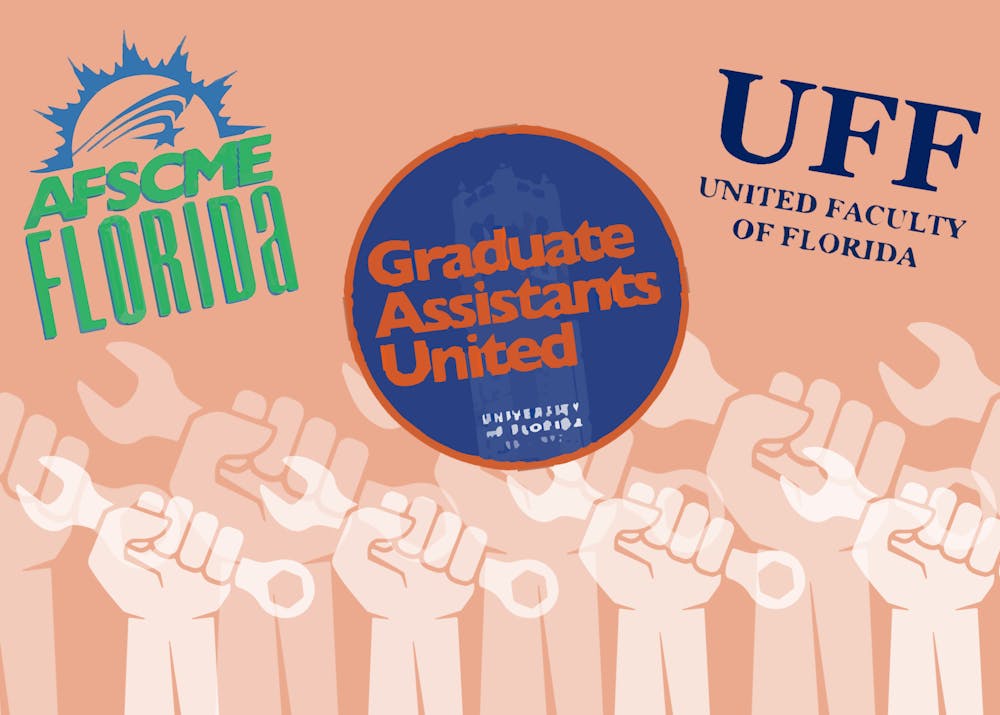Almost one year after Gov. Ron DeSantis signed a law changing certification requirements for Florida public employee unions, one UF union is gone, and two are struggling to survive.
The law, from Senate Bill 256, requires public sector unions boost the rate of members paying dues to 60% or else be decertified.
Since 2018, Florida law has required teachers unions have 50% of members pay dues. The new law expanded the requirement to all public employee unions — with the exception of law enforcement officers and firefighters — and raised the bar 10 percentage points.
Any union failing to meet the threshold has one month to collect “interest card” signatures from at least 30% of members agreeing to continue being represented by the union. If the signatures are accepted, the union must hold an election showing at least half of those eligible to join the union want to be represented.
At least 28 unions have been fully decertified and 42,000 public sector workers in Florida have lost representation, according to a public database created by WLRN.
Five unions had contracts with UF before the law was enacted. Two of them, for police officers and lieutenants, were unaffected.
Of the three remaining, the graduate student union and faculty union failed to meet the 60% membership requirement but secured interest cards to remain another year.
Only the non-instructional staff union has been fully decertified.
‘They’re going to have no rights’: staff union decertified
Maryann Daniel found out about the new law from a NewsBreak notification on her phone. The UF physical plant division employee knew instantly what it meant for the staff union she’d led for five years: decertification.
The UF staff union represented employees including plumbers, groundskeepers and computer repair technicians. It was decertified by the state Jan. 22 after failing to report 60% dues-paying members.
But the death knell came not from the law passed in May, but from a UF rule created two decades prior.
When Daniel joined the university 26 years ago, she was classified as USPS, or University Support Personnel.
In January 2003, UF introduced a new personnel category called TEAMS, or Technical Executive, Administrative and Managerial Support. Other than slightly different contract terms, TEAMS employees differ from USPS employees in one major way — they were not allowed to join the union.
The UF staff union was limited to people hired before 2003 as a result.
During her time as president, Daniel watched the union’s membership flounder as her coworkers began retiring. But she still used her power to hold UF accountable for how it treated employees, she said.
Under union contract, Daniel’s superior had to email her every time the division created a new rule, Daniel said. Since the union’s decertification, Daniel’s USPS coworkers are being reprimanded for breaking new rules they weren’t told existed, she said.
“I’ve never seen anything like it,” she said. “They have never been wrote up before in their life, they do the same job they’ve been doing for 30 years. And now they’re being wrote up because, ‘You’re not doing it right.’”
Two women have already called Daniel to tell her they’re leaving because they can’t take the mistreatment anymore, Daniel said.
“They’re going to get no rights,” Daniel said. “These poor, poor people, there’s nothing they can do. They just have to go with the flow or retire — and that’s what they’re trying to do, get them out.”
UF’s staff union was a local chapter of the American Federation of State County and Municipal Employees, a national public sector employee union.
Torrell Johnson, a 57-year-old union organizer, served as UF’s regional representative on AFSCME’s behalf. He also worked with universities throughout northern Florida, including Florida State University.
AFSCME laid off Johnson and the majority of his staff in August, three months after the law went into effect. Of the 25 unions Johnson used to oversee, 21 are now decertified.
AFSCME failed to file recertification petitions for at least 30 of its bargaining units across the state, including UF’s.
Johnson doesn’t know whether there’s anything AFSCME leadership could have done differently, he said. He’s mostly just frustrated with state legislators, he said.
“I’m hoping more eligible employees open their eyes and see the attacks that are being made on the unions in the legislature,” he said. “These attacks appear to be aimed at unions, but in turn, it’s going to be their jobs.”
AFSCME remains committed to protecting public services workers’ rights, freedoms and voices, said representative Mark McCullough in a statement to The Alligator April 16.
Though their only official union has been decertified, UF staff retain some representation through United Campus Workers, a statewide non-instructional staff union whose UF chapter began in 2021.
Unlike the former AFSCME union, UCW is open to all university staff, including TEAMS and USPS. However, the young union doesn’t have a contract with the university. Its members can circulate petitions, organize protests and request meetings with university administration, but it can’t make administration come to the bargaining table, said UCW fellow and former UF librarian Kestrel Ward.
As an uncertified union, UCW was technically unaffected by the law. But recruitment has worsened since it passed, Ward said.
“There’s always a lot of misinformation about unions, and so this just spread further misinformation,” they said. “People just heard there was an anti-union law, and a lot of people just assume that means that unions are over.”
Graduate Assistants United: Keeping a union alive
Between card collecting and weekly negotiations, Graduate Assistants United will remain active for another year.
Kathryn Feerst, a 26-year-old UF evolutionary biology Ph.D. student, stepped in to help with GAU’s card campaign during Spring 2024 Blitz Week, GAU’s card signing campaign.
The campaign began after SB 256 passed. GAU wasn’t going to reach its 60% goal by February 2024, so it got 40% of graduate assistants to sign cards stating they supported the union.
Feerst tabled for four days during Blitz Week in February. By the end of the week, GAU members signed more than 1,800 cards and bought the union another year of survival.
Having the union on the line was stressful for members, Feerst said.
Without the protections in the collective bargaining agreement, tuition assistance and higher salaries could be at risk, Feerst said. It would mean many graduate assistants couldn’t pursue their master’s or Ph.D.
“A lot of us just can’t survive without a lot of the things that the union guarantees us in our bargaining agreement,” they said.
GAU is no longer collecting cards and has shifted to increasing membership to reach the 60% goal.
“We’re not trying to sell people something,” Feerst said. “We’re trying to help protect our community. The more members we get, the more power we have to ask for better working conditions.”
While GAU works on building its membership, the union’s bargaining team spends Thursday afternoons going through articles of its collective bargaining agreement with UF.
The union’s previous contract expired in December. For any current grievances or issues, graduate assistants will have to refer to the old contract until the new one is approved. After approval, the new agreement will go into effect for the next three years.
Brandon Silva, a 24-year-old UF computer science Ph.D. student, is GAU’s treasurer and a bargaining team member. The bargaining sessions have been going well, he said, but some moments get heated when both teams are frustrated with each other.
The bargaining process often feels “heavily weighted” on UF’s side, Silva said.
“We really don’t have many options to have UF meet our demands,” he said.
Bargaining has been overwhelming, said Austin Britton, a 26-year-old UF geography Ph.D. student and member of GAU’s bargaining team. The team has juggled 28 articles at once, all while having to bargain the most contentious articles at the end of the semester.
“We are a group of graduate students that are not experts in contracts and contract language,” Britton said. “We're doing this in our free time.”
Some contentious articles include Article 4, which requires the university to show evidence of negative performance reviews and give graduate students a chance to fix the issue before denying reappointment, and Article 13, which ensures graduate students access to gender-neutral bathrooms and expands the definition of sexual harassment and discrimination, Britton said.
GAU has also proposed a completely new article, Article 27, focused on graduate housing. The new article creates protections, including helping graduate students pay less for housing, Britton said.
There’s a rush to get through the bargaining process due to Florida legislation, he added.
“This is our one chance we get every three years to maybe get ahead of the game and make these impacts,” he said. “Otherwise, we’re going to be locked into language that could allow future discrimination.”
Full contract bargaining started in fall 2023 and will continue until everything has been reviewed.
“You're helping keep a very strong union not only for yourself but for the future generations of grad students that come here,” Britton said. “And I think it's worth every penny and more.”
UFF-UF battles dues on top of post-tenure review
The UF faculty union, United Faculty of Florida-UF, failed to reach its 60% dues-paying members mark. But like GAU, after a card-signing campaign, it showed 30% of members wanted UFF-UF to represent them.
Now, the union has until March 2025 to try again for 60%. Dues-paying members currently make up about 40% of the union, said former UFF-UF president and current UFF fellow Steve Kirn.
As another part of the new law, unions can no longer take dues directly from members’ paychecks. Instead, unions must create their own payment systems. UFF-UF lost several hundred members simply because people never did the necessary paperwork to switch to the new system, Kirn said.
“I’m spending about 20 hours a week going door-to-door in building after building, knocking on doors and saying, ‘You used to be a member, and when we had to go to the electronic dues thing you didn’t rejoin. Will you please rejoin?’” he said.
While Kirn knocks on doors, current UFF-UF president Meera Sitharam has her hands full navigating other challenges levied on the union in the past year.
Among the most daunting is the ongoing bargaining between the union and university over the post-tenure review requirement created in a Board of Governors regulation March 2023. Under the regulation, tenured faculty will undergo job performance reviews every five years, beginning this Spring, and they can be fired if their contributions are deemed unsatisfactory.
UF faculty began receiving post-tenure review packets April 1 to be submitted April 19. Each department was given different criteria to judge job performance.
The proposed research criteria for psychology faculty included 34 or more peer reviewed articles in the past five years and grant awards of $2 million or more in order to meet the “exceeds expectations” category.
The provost derived the criteria benchmarks from research output averages from similar public universities, Sitharam said. But comparing group averages to each individual faculty member doesn’t make sense, she said.
“Unit average automatically means a lot of people are earning more than that,” she said. “Now you want to raise everybody below the average to the average? The total number will become so big — I don’t even know where to start.”
Sitharam herself was selected for review. She’s treated herself as a guinea pig — navigating the process and sending emails every time she notices a hitch in the system, like a broken link or one that auto-populates incorrect data, she said.
UFF-UF heard the Board of Trustees will be filing impasse over post-tenure review, meaning the university will continue imposing the review but must continue negotiating with the union over its critiques of the review. The union plans to file an unfair labor practice charge as a response to the issue, Sitharam said.
In addition to the union membership law and post-tenure review regulation, UFF-UF’s latest concerns include a bill blocking Florida faculty from making offers to international graduate students from seven countries, including China and Iran. The union also filed a federal lawsuit over another state law in August that banned it from arbitrating faculty tenure, firing and other personnel decisions.
UFF-UF will navigate these and other new laws restricting Florida faculty in the upcoming year — all while fighting to ensure their union remains alive to do so.
Contact Zoey Thomas at zthomas@alligator.org and Delia Rose Sauer at drosesauer@alligator.org. Follow them on X @zoeythomas39 and @_delia_rose_.

Zoey Thomas is a UF media production senior and the Spring 2026 editor-in-chief of The Alligator. She has previously been data editor and engagement managing editor, as well as a reporter for three semesters. She was also a intern at the Orlando Sentinel. In her sparse free time, Zoey enjoys reading a good book, going for a run or waking up her roommates with the sound of her espresso machine.
Delia Rose Sauer is a journalism senior and the Summer 2025 Editor-in-Chief. She reported on the university desk for two semesters. When she's not glued to her laptop, she's drawing on Procreate, crocheting or creating a new Spotify playlist.






